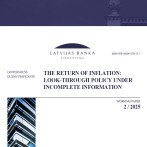The 12-month inflation still 'hesitating' on the first step
According to the data of the Central Statistical Bureau, the consumer price level in August was slightly lower month-on-month, due to seasonal factors (by 0.7%), but remained the same year-on-year. The low inflation still reflects supply-side factors, slower economic growth does not create the conditions for the rise in demand and pressure on prices. Therefore, it is expected that in the coming months inflation, albeit positive, will remain low.
In August, the monthly inflation was negatively affected by seasonal factors. These factors were lower prices of fruits and vegetables as well as continued sales of wearing apparel and footwear. A decreasing factor was also fuel prices, which, with a slight delay, reflected the lower global oil prices in the second half of July and beginning of August. The impact of these factors was partially compensated by some seasonally fluctuating prices, for instance, the rise in prices of package holiday services and several supply side factors, including the rise in some regulated prices (the price of natural gas had grown for the industrial consumers, and substantially higher tariffs of water and sewage services came into effect in Rēzekne and the prices of heating energy changed slightly in Jelgava). The price of tobacco products still rose only slightly – it could be the impact of excise, which was 'missing' in the July inflation and was expected with a slight delay.
The annual inflation did not change substantially (it was 0.0%), and the most important negative contribution to it was made by energy prices, whereas the positive contribution consisted primarily by service prices, including in some groups of services, which comprise regulated prices or in which the indirect taxes have changed.
In the coming months the annual inflation is expected to be positive, albeit very low and not reaching even 1%. The rise in annual inflation will be substantially affected by the decrease of the negative contribution of fuel and other energy components, for a year-on-year drop in oil prices in the world market is no longer observed. Food prices in the world market also returned to a rising trend in August (with the exception of cereal products) and, according to FAO data, have reached their highest 15-moth level. The level of food prices domestically will be impacted also by harvesting problems and the quality of harvest because of the unfavourable conditions in August.
On the demand side as well, a substantial pressure on inflation is unlikely to resume in the coming months. Data on economic growth in the first six months are fairly moderate overall. The data on wage rises likewise do not promise a rapid rise in purchasing power and, along with the negligible rise in employment and growth projections in some exporting partners rather mark a wait-and-see attitude on the part of consumers.
Textual error
«… …»






